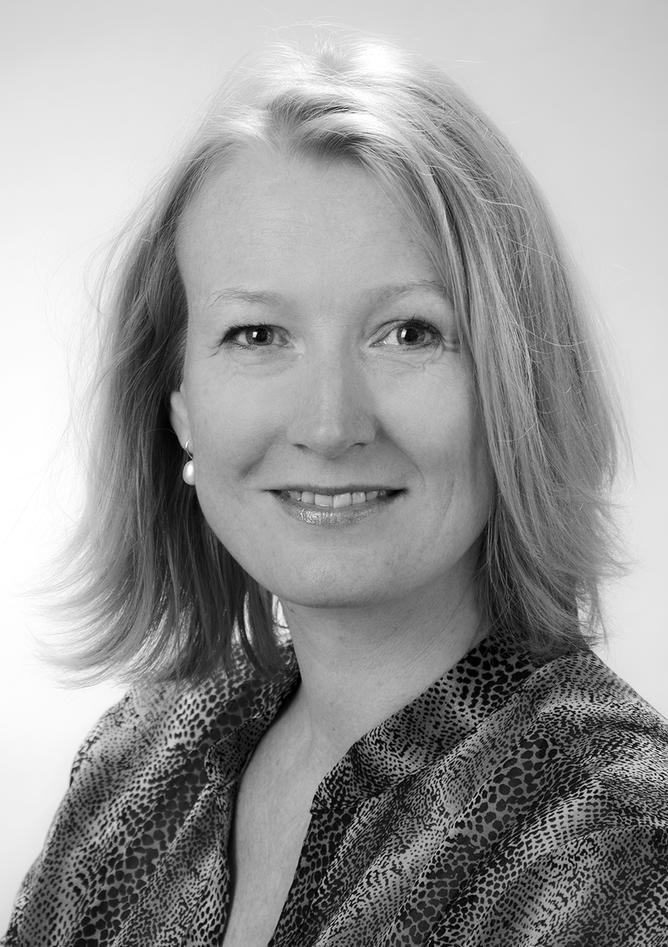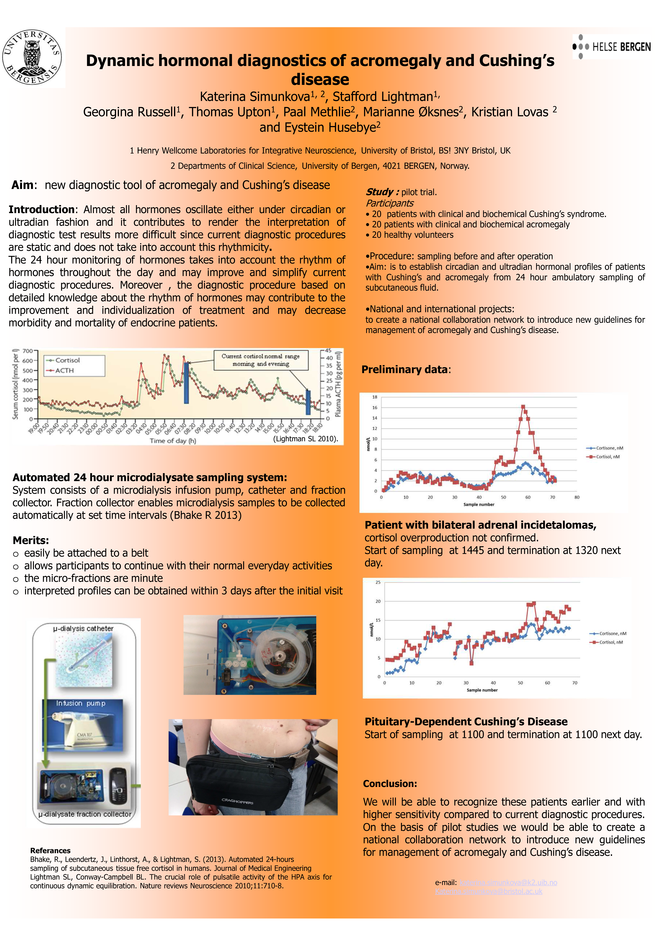Ultradian
We propose to transform current endocrine diagnostics from time-consuming single-analyte and complex function tests to dynamic endocrine diagnostics which can be performed at a “one stop clinic” appointment.
Ultradian Hormone Diagnostics
Main content
Ultradian develop novel and dynamic diagnostic of endocrine disorders. Current workup is characterized by often time consuming evaluation of single hormone measurements hormones, sometimes supplemented with complicated dynamic tests. Ultradian dynamic testing combines ambulatory sampling of interstitial fluid over 24 hours with novel ultra-sensitive assays of hormones using only microliter volumes.
The University of Bergen (UiB) engaged in the European Union's Framework programs for research and technological development and has been designated as a European Research Infrastructure and a Research Training Site in several scientific fields. UiB is currently involved in 105 FP7 projects, 36 of which it coordinates, including seven ERC Advanced Grants, one ERC Starting Grant and one ERC Synergy Grant. In addition, UiB hosts three National Centers of Excellence awarded by the Research Council of Norway. In 2014, the Research Council of Norway awarded funds to UiB for the development of infrastructures that include Health Registries for Research. In addition, UiB coordinates the Norwegian node of the pan-European research infrastructure ELIXIR for biological information
The Faculty of Medicine and Dentistry (MOF) consists of five departments spanning a wide range of disciplines: Clinical Science, Biomedicine, Clinical Medicine, Clinical Dentistry and Global Public Health and Primary Care. The faculty’s strategies include focused translational research to generate new knowledge and best practice for clinical studies and trials, and the development of methodological platforms, among them Metabolomics (on which LCMS/MS-based assays of steroids in microfluid is being developed). MOF is involved in 23 EU projects, 6 of which it coordinates in the programs Health (3) and MC-IEF (2) and 1 ERC Advanced Grant. MOF hosts two of the three National Centers of Excellence at UiB: Centre for Intervention Science in Maternal and Child Health and Centre for Cancer Biomarkers.
University of Bristol is a member of the Russell Group of research intensive universities, and is regularly in the top universities of the world for its research activities. The Henry Wellcome Laboratories for Integrative Neuroscience and Endocrinology (LINE) is a multidisciplinary research centre with approximately 120 scientific staff including 15 PIs. Research is carried out in the custom built Dorothy Hodgkin Building (completed in 2004) which provides superb molecular and imaging laboratories as well as integrated animal facilities for physiological and behavioural studies. The research teams in the building cover stress and endocrinology, integrative neuroscience and behavioural, cell signalling, synaptic plasticity and CNS repair. There is also a very active postgraduate teaching programme with 32 PhD students and three MSc courses in molecular neuroscience, stem cells and regeneration and reproduction and development.
Clinical studies are carried out in the adjacent specialist centre (CRIC) jointly funded by the University of Bristol and the University Hospitals Bristol NHS Foundation Trust. This houses both clinical investigation and high resolution fMRI facilities. Collaborative work is also carried out in the two University of Bristol NIHR funded and registered clinical trial units – the Bristol Randomised Trial Collaboration (BRTC) and the Clinical Trials and Evaluation Unit (CTEU). Active collaborations are in progress with the National Institutes of Health, Bethesda, USA, the University of Boulder, Colorado, USA, the University of Leiden, The Netherlands and the University of Oxford, UK.
Karolinska Institutet (KI), founded in 1810, is Sweden’s only university especially focusing on biomedical sciences. In addition, KI annually awards the Nobel Prize in Physiology or Medicine. KI ranks as one of the world’s leading medical universities, thanks in part to the quality of its research activities, which today account for 40 per cent of all medical research in Sweden.
KI has about 4 200 employees (full-time equivalents), nearly two-thirds of whom are female. Some 80 per cent of KI’s income is devoted to research, distributed among some 600 research groups covering all medical fields. KI provides excellent postgraduate training with 2100 registered PhD students from around the world who are active in both basic and clinical research. Research at KI has a strong European dimension, with almost 200 project participations within the EU’s now closed Sixth Framework Programme (FP6). Of these, KI coordinated 28 projects. KI is a major player in FP7, participating in some 323 projects including 36 as coordinator as well as 31 European Research Council Grants. KI is also a major European beneficiary of funds from the National Institutes of Health in the U.S.
Department of Medicine (Solna) at KI has 800 employees the majority conducting translational research using a combination of clinical studies, patient material available in large biobanks and experimental research, most of which is performed at the Centre for Molecular Medicine (www.cmm.ki.se), a centre which provides outstanding research resources.
OLINK AB has a track record of scientific and business achievements as a developer of novel tools for protein detection and nucleic acid analyses that enable researchers to see further into biology revealing new insights into basic science, drug development, and diagnostics. The Duolink product line enables researchers in academia and the pharmaceutical industry to visualize and accurately quantify individual proteins, their interactions and modifications, in unmodified cells and tissues. The Proseek MUX product line is designed for the detection and quantification of multiple proteins in serum or plasma samples, with the major benefit of using extremely low sample volumes; only 1 μl is required for each reaction.
With the technologies above, OLINK is serving the top-ten global pharma and thousands of users has led to more than 500 scientific, peer-reviewed publications. The company's technologies, covered by more than 35 patents, are also commercialized through out-licensing to industry leading partners such as Affymetrix, Life Technologies, and through the spin-out companies Halo Genomics (now Agilent Inc.) and Q-linea. OLINK Bioscience was founded in 2004, is privately owned and headquartered in Uppsala, Sweden with 30 employees.
DESIGNWORKS is a multi-disciplinary design consultancy in the purest form. They work across a wide range of market sectors from FMCG to Medical device technology. Supplying conceptual design (IP) mechanical engineering, test/demonstration/evaluation prototypes through to detail manufacturing information and possible production.
They have developed many successful devices for research institutions and private companies. Often working with a cross platform team based of University professionals and private equity IP company executives in ‘spin-out’ situations.
DESIGNWORKS have the in-house ability to develop new products from the ground up. Including low volume production, electronics and testing. We work closely with a network of carefully selected industry professionals and institutions to provide certification and test-house documentation where required. They are currently working on two grant funded projects within the medical arena.
Evangelismos Hospital (EGH) is currently the largest Hospital in Athens-Greece, expanding to all specialties with both clinical and academic activities that cover the whole spectrum of hospital based medicine. The Department of Endocrinology and Diabetes of EGH, that intends to participate in the project, represents the major clinical and teaching Endocrine department in the country. It receives numerous referrals of common and rare endocrine disorders, including those most relevant for the project such as patients with Cushing’s syndrome and pituitary tumours.
Its infrastructure includes 15 beds devoted to intensive endocrine investigation and/or treatment of endocrine patients. These are well supported by a dynamic endocrine test unit and a laboratory with special interest and expertise for all hormone measurements. The department receives a large patient load from the very busy outpatient clinic and referrals from all over the country, due to its expertise in adrenal, thyroid, pituitary disorders and type-1 diabetes. Therefore the Endocrine department will efficiently contribute to the clinical part of the project by including a substantial number of well-studied patients with all forms of Cushing’s syndrome.
More information is here.

